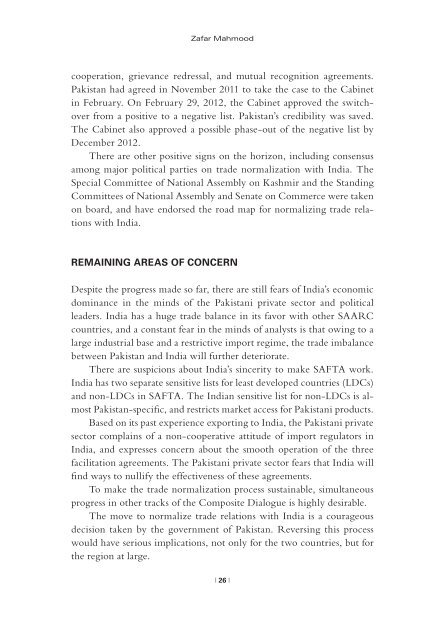You also want an ePaper? Increase the reach of your titles
YUMPU automatically turns print PDFs into web optimized ePapers that Google loves.
Zafar Mahmood<br />
cooperation, grievance redressal, and mutual recognition agreements.<br />
<strong>Pakistan</strong> had agreed in November 2011 to take the case to the Cabinet<br />
in February. On February 29, 2012, the Cabinet approved the switchover<br />
from a positive to a negative list. <strong>Pakistan</strong>’s credibility was saved.<br />
The Cabinet also approved a possible phase-out of the negative list by<br />
December 2012.<br />
There are other positive signs on the horizon, including consensus<br />
among major political parties on trade normalization with <strong>India</strong>. The<br />
Special Committee of National Assembly on Kashmir and the Standing<br />
Committees of National Assembly and Senate on Commerce were taken<br />
on board, and have endorsed the road map for normalizing trade relations<br />
with <strong>India</strong>.<br />
reMaininG areas of ConCern<br />
Despite the progress made so far, there are still fears of <strong>India</strong>’s economic<br />
dominance in the minds of the <strong>Pakistan</strong>i private sector and political<br />
leaders. <strong>India</strong> has a huge trade balance in its favor with other SAARC<br />
countries, and a constant fear in the minds of analysts is that owing to a<br />
large industrial base and a restrictive import regime, the trade imbalance<br />
between <strong>Pakistan</strong> and <strong>India</strong> will further deteriorate.<br />
There are suspicions about <strong>India</strong>’s sincerity to make SAFTA work.<br />
<strong>India</strong> has two separate sensitive lists for least developed countries (LDCs)<br />
and non-LDCs in SAFTA. The <strong>India</strong>n sensitive list for non-LDCs is almost<br />
<strong>Pakistan</strong>-specific, and restricts market access for <strong>Pakistan</strong>i products.<br />
Based on its past experience exporting to <strong>India</strong>, the <strong>Pakistan</strong>i private<br />
sector complains of a non-cooperative attitude of import regulators in<br />
<strong>India</strong>, and expresses concern about the smooth operation of the three<br />
facilitation agreements. The <strong>Pakistan</strong>i private sector fears that <strong>India</strong> will<br />
find ways to nullify the effectiveness of these agreements.<br />
To make the trade normalization process sustainable, simultaneous<br />
progress in other tracks of the Composite Dialogue is highly desirable.<br />
The move to normalize trade relations with <strong>India</strong> is a courageous<br />
decision taken by the government of <strong>Pakistan</strong>. Reversing this process<br />
would have serious implications, not only for the two countries, but for<br />
the region at large.<br />
| 26 |


